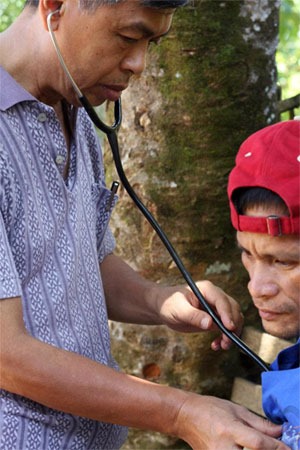Harassment of anti-pesticides expert derails independent monitoring of agrochems' impact
http://www.panap.net/campaigns/land-food-rights/noland-nolife/post/2699
Press Statement
PAN Asia Pacific (PANAP) strongly condemns the continued persecution of Dr. Romeo Quijano, a member of our Steering Council, for his relentless work against aerial spraying of pesticides in banana plantations in the Philippines.
lIn 2000, the now-defunct The Philippine Post published Dr. Quijano’s extensive research entitled “Poisoned Lives” that exposes the pesticide poisoning in LADECO banana plantations. A libel case stemmed from the said article but has been dismissed. Now, the case is being revived that could result in Dr. Quijano losing his license as a doctor.
This after he has been slapped with a complaint of “unprofessionalism” before the Professional Regulatory Commission (PRC) for “spreading lies” that supposedly hurt the local banana industry. Reported complainants were six individuals from a village in Hagonoy town in the province of Davao del Sur in the southernmost Philippine island of Mindanao.
Dr. Quijano is a retired professor of the University of the Philippines (UP) – Manila, Department of Pharmacology and Toxicology. Aside from being a member of PANAP’s Steering Council, he is also the current president of Pesticide Action Network (PAN) Philippines. 
But what is more alarming is that it impedes independent initiatives by cause-oriented groups and individuals such as PANAP and Dr. Quijano to closely monitor pesticide use, given the well-documented effects of such chemicals on the health and livelihood of rural people and on the environment. Dr. Quijano is one of those who conceptualized and has been implementing PANAP’s Community-Based Pesticide Action Monitoring (CPAM), a comprehensive tool for community documentation of the impact of pesticides on people’s health for advocacy purposes.
We believe that the revival of an already dismissed case against Dr. Quijano does not only threaten his life and liberty but is also meant to undermine the people’s campaign to protect public health and the environment from the obvious harmful impact of pesticides. Instead of facing squarely the allegations that are the result of meticulous research and field work, the banana plantation industry, which is apparently behind the revived case against Dr. Quijano, resorts to cheap intimidation tactics.
The persistent harassment of Dr. Quijano, who is highly regarded in the international scientific community, can also be seen in the context of systematic human rights violations – including the filing of trumped-up charges – against activists, advocates and defenders of human rights, land and resources in the Philippines.
Our human rights monitoring initiative Land & Rights Watch (LR Watch) aims to closely monitor and expose the situation of communities opposing land and resource grabbing. It reveals that the Philippines has the highest number of victims of human rights violations in the context of land resources grabbing from January to September 2015. (See here)
Under his helm, PAN Philippines and its partner organizations are spearheading local campaigns to increase public awareness on the dangers of highly hazardous pesticides and the aerial spraying of pesticides, especially in banana plantations. He has led several fact finding missions in rural communities affected by aerial spraying and rampant pesticide use by banana and oil palm plantations in the Philippines’ southern island of Mindanao. Reports derived from these missions have been useful for policy lobbying both at the national and international levels.
###
Reference:
Sarojeni Rengam, nolandnolife@panap.net
Deeppa Ravindran, deeppa.ravindran@panap.net
